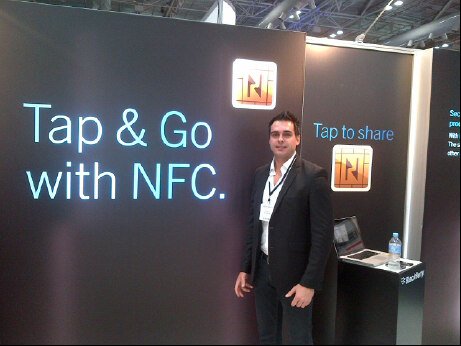New 5G report helps Australian businesses ‘prepare to profit’
WHAT does the upcoming 5G telecommunications network really offer Australian business that is not available already? The answer is, a surprising amount according to new research by Samsung Electronics Australia, in partnership with Tech Research Asia (TRA).
The Samsung-TRA report and whitepaper, 5G for Business in Australia, spells out how the advent of 5G networks, devices and services can support the goals of Australian businesses.
According to Danny Mandrides, the head of Enterprise and Government, IT and Mobile for Samsung Electronics Australia, the report also explores perceptions, awareness and levels of understanding that Australian businesses hold in relation to the availability and advent of 5G mobile technology.
“There is no doubt that 5G is both a trigger and an engine that will transform the way Australians live and work, but also how businesses operate in an increasingly mobile driven economy,” Mr Mandrides said.. “Now more than ever before Australian businesses are telling us that they demand the bandwidth, stability, and opportunities that 5G will bring. 
“At Samsung, we want to help ensure our customers and partners develop the best possible approach to adopting the latest in network and device services and this includes building our respective understanding for how innovations in 5G can help break barriers and solve real challenges for Australian organisations,” Mr Mandrides said.
5G for Business in Australia’s research methodology delved into the views of more than 800 technology decision makers from a cross-section of industries to help shape a view of how businesses are considering the implications of 5G and their readiness to adopt.
The report revealed that almost a quarter (24%) of businesses in Australia intend to adopt 5G services for business in the coming 18 months, with almost 80 percent of Australian businesses set to adopt 5G related mobility services within the next three years. These findings set the tone for the potential roadmap of adoption of 5G by Australian businesses.
RESPONDING TO CONCERNS
The report also explores the potential concerns and barriers that organisations are considering in relation to 5G, as well as the perceived benefits of the greater 5G connectivity, network availability, and device capability that it will offer workforces.
Key findings have also revealed a keen interest in the potential applications of 5G mobile devices, as well as Fixed Wireless Access (FWA).
About 37 percent of Australian businesses are taking a ‘considered’ approach to 5G adoption, while 24 percent are being either ‘aggressive’ (at 12%) or ‘opportunistic’ (at 12%) in terms of rapid or early adoption of 5G respectively.
About 18 percent of participants said that their adoption plans would be ‘gradual’ and in line with network deployments while 16 percent stated that they have no specific strategy until 5G is ‘ubiquitous’.
Just 4 percent of respondents classified their approach to 5G as in a ‘deliberation’ stage where they are needing to determine the actual benefits and availability of 5G. 
TRA founder and director Tim Dillon said, “Australian businesses are at the global forefront in terms of their position to be leaders in exploring new territories and capabilities associated with 5G powered products and services.
“We will see rapid change in the coming years for how people bolster their business operations and strategy with 5G powered services.
““There is naturally a degree of intrigue, interest, excitement, and keenness from businesses to understand how they should be thinking about what the future may bring, which is why it’s critical they build their understanding of 5G and develop a plan that can be actioned to deliver solid outcomes and avoid potential pitfalls or redundant investments,” Mr Dillon said.
MORE THAN SPEED
Australian businesses recognised that the benefit of 5G extends beyond speed, including other major capabilities such as edge computing, multi-device connectivity, low network latency and network slicing.
Organisations see 5G enhancing their current and future operations in areas including customer engagement, data access and management, supporting cloud services consumption and facilitation of intelligent workplaces.
“It’s incredibly important for Samsung to ensure that we understand the needs of Australian business and where our 5G enabled products, solutions, and partnerships can provide value and enrich their operations in next stage of our mobile economy,” Samsung’s Mr Mandrides said.
5G for Business in Australia includes a 5G readiness checklist designed to help businesses better understand the key factors involved in making decisions related to the next stage in network connectivity. 
The checklist considers the role and impact of devices, network deployment, existing and planned digital strategies, workplace environments, compliance and other key elements that businesses may wish to take into account. The report also highlighted key points for businesses to focus upon, leading up to 5G adoption:
NEED FOR 5G RECOGNISED
About 68 percent of Australian businesses feel that their operations are constrained by current network performance, and 60 percent of businesses feel there is a need for 5G services to meet business needs above current 4G connectivity.
While early 5G solutions implemented by businesses will focus on bandwidth-centric approaches, the report has indicated that they will seek to quickly develop and integrate higher value-added solutions such as slicing and edge computing.
These solutions present the opportunity to implement IoT, AI-supported decision-making tools, predictive analytics and real-time data.
Despite the strong rates of expected adoption, the report identified that 1 in 2 (50%) of Australian businesses feel they require additional information to understand exactly why 5G is a better solution than current 4G. Businesses are also anticipating some challenges during the adoption of 5G services, specifically around pricing, device availability and network coverage.
In addition to research and insights, Samsung has announced that it is already collaborating with a number of Australian organisations in relation to trial mobility programs that involve 5G.
Samsung has found that 5G is already impacting Australian businesses, through its collaborative work with many organisations, and offered several examples in the report:
Improved customer service and engagement in the consumer banking sector: A major Australian bank is trialling 5G branch connectivity linked to smartphones and Samsung’s DeX solution, ensuring seamless connectivity and information access for its mobile customer service and banking employees.
Data management, information access, health and safety/asset protection for government and emergency services: An Australian AI company that has created 5G connected drones to undertake aerial surveillance of areas under bush fire threat equipped with AI to identify issues and assets on the ground in real-time to assist emergency service and fire crews.
Intelligent workstyles, costs reductions and efficiencies in the manufacturing sector: A production site connecting multiple device sensors combined with AI analytics to a smart device dashboard app that provides real-time information on manufacturing performance and quality to reduce defects and materials costs.
GETTING 5G-READY
According to the report, every organisation is different and will take a unique approach to adoption.
The 5G for Business in Australia report advises businesses to consider several factors to inform its approach to the adoption of 5G technology.
Businesses should:
- Understand network deployment and handset availability
- Determine unique device needs
- Understand the service provider’s 5G strategy
- Consider how 5G compliments the company’s overall digital strategy
- Determine all possible business cases
- Understand how future data needs may change
About the 5G for Business in Australia report
Tech Research Asia surveyed 813 IT and line-of-business decision-makers in Australian organisations in May 2019. To develop this report, TRA also interviewed CXO-level representatives from 25 Australian and international organisations to understand their view of 5G, goals, business focus and activities.
ends

 How to resolve AdBlock issue?
How to resolve AdBlock issue?